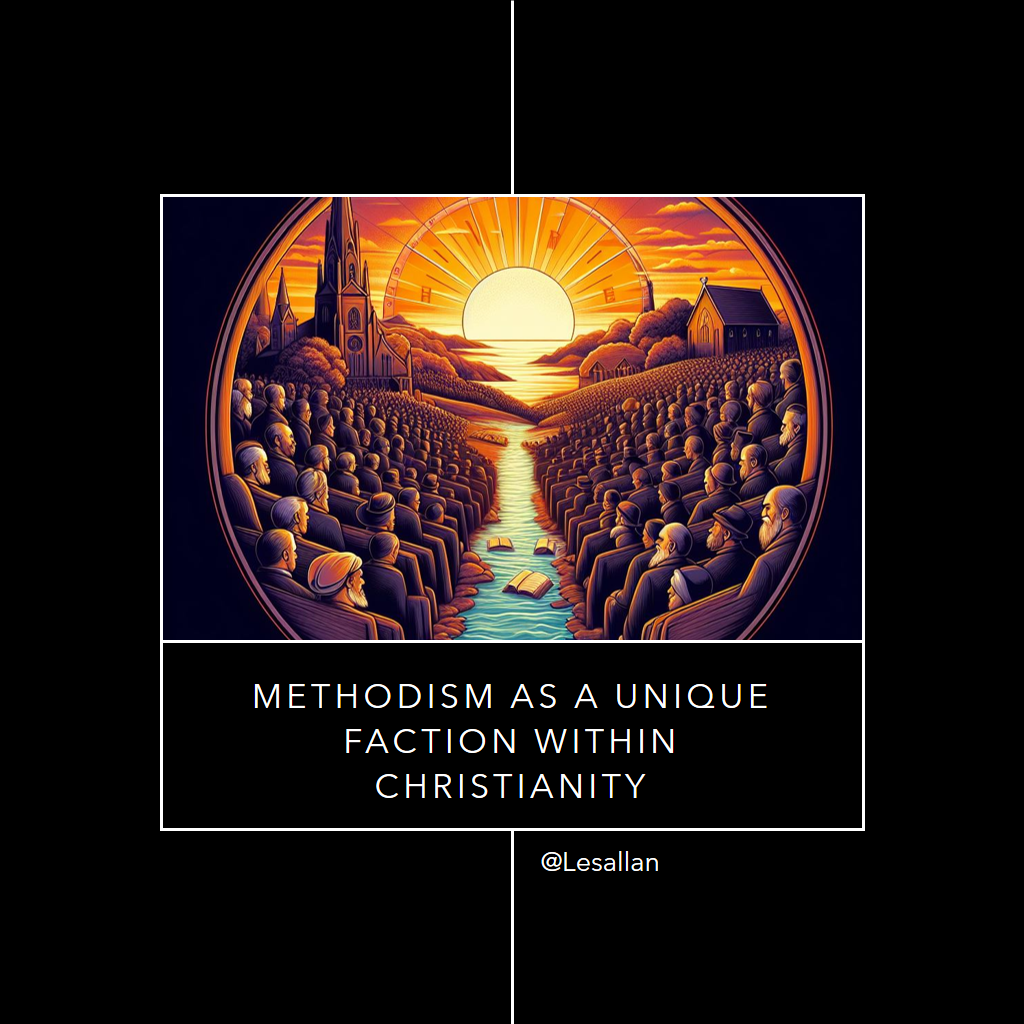Rewritten and Revised by Lesallan

The Methodism Distinguished Discussion – Revised
Rewritten and Revised by Lesallan – January 25, 2024
In the upcoming dialogue, I will share my thoughts on Collins’ (1999) chapter five regarding the rise of Methodism as a unique faction within Christianity. Specifically, I will delve into two noteworthy elements: the concept of complete sanctification and the effect of Methodism on society. Additionally, I aim to clarify why Methodism is significant in Christianity’s and the world’s historical narrative.
In his work published in 1999, Collins offers a thorough examination of the origins and impact of Methodism as both a religious and social movement. Of particular interest to me was the principle of entire sanctification, which Collins defines as “the condition of being purged of all sin and filled with genuine love for God and others” (Collins, 1999). This fundamental belief was rooted in Wesley’s interpretation of scripture, particularly 1 John 3:9, which states that “Whosoever is born of God doth not commit sin; for his seed remaineth in him: and he cannot sin, because he is born of God” (KJV). Wesley argued that this passage suggested that individuals could attain a state of perfection in this life, where they would be free from intentional wrongdoing and motivated by pure love. This viewpoint was not universally accepted among Christians, with Calvinists such as George Whitefield believing that humans were inherently sinful and could not achieve such a lofty level of spiritual purity. This disagreement separated Whitefield and Wesley and helped establish Methodism as a movement distinct from Calvinism.
One element that particularly caught my attention was the influence of Methodism on society, particularly for those who were impoverished and marginalized. Collins recounts how Wesley and his adherents spread the gospel to the masses, often gathering in public spaces and forming communities, classes, and groups for spiritual guidance and accountability. They also participated in various social initiatives, including ministering to prisoners, promoting education and healthcare, advocating for abolition, and championing women’s rights. According to Collins, Methodism served as “a positive force in society” (Collins, 1999), contributing to England’s ethical and spiritual revival in the 18th century.
Considering these factors, Methodism held a significant place in history as it presented a groundbreaking perspective on Christian purity and societal fairness. It defied the conventional beliefs surrounding human nature, redemption, and divine favor, motivating countless individuals to pursue a more profound connection with God and fellow citizens. Moreover, it highlighted how the gospel can revolutionize individuals and communities, irrespective of their standing in society or financial situation.
To summarize, the reading from Collins (1999) has provided me with a greater comprehension of the origins and importance of Methodism as a historical event. I am now knowledgeable about complete sanctification and its implications for Christian living and theology. Additionally, I have gained an understanding of Methodism’s societal influence and its contribution to shaping English culture and values. My newfound perspective has allowed me to acknowledge Methodism as a movement that has enriched Christianity and the world with its message of love and holiness.
Blessings,
Lesallan
References:
Collins, K. J. (1999). A Real Christian: The Life of John Wesley. Abingdon Press.
This is the Personal Academic Response to another student:
“Thank you for your insight; this chapter also taught me a lot. I found it interesting that there is still evidence today of this split, in that United Methodists differ from those who belong to Calvinist Methodist Churches. We can see how history unfolded with these two schools of belief and the two men who worked to popularize them. It seems to me that a lot can be said about how Wesley taught people about God’s love, and how Whitefield taught people about God’s love. Out of the two, Wesley sure seemed to have had a more compassionate form of ministry, as his interpretations of the scriptures appeared to accentuate God’s love and desire for us to repent and live good lives in service to him. Whereas Whitefield continually showered people with God’s sovereignty, the peace that can come from being still and knowing God.”
In response, I have written:
I appreciate your thoughtful response to my discussion. I agree that Wesley and Whitefield had different approaches to preaching God’s love and sovereignty. Both had some valuable insights but also some limitations. For example, Wesley’s emphasis on free will and human responsibility could be seen as empowering and motivating but also as putting too much pressure on people to achieve perfection. Whitefield’s emphasis on God’s grace and election has two sides. It can offer comfort and assurance but can be perceived as discouraging and fatalistic. How can we balance these two perspectives in our faith and practice today?
I also find it fascinating how the historical context influenced their theology and ministry. Wesley was responding to his time’s social and moral problems, such as poverty, slavery, and corruption. He advocated for social justice and personal holiness and organized his followers into small groups for mutual support and accountability. Whitefield was reacting to his time’s religious and intellectual challenges, such as deism, rationalism, and skepticism. He defended the authority and inspiration of Scripture and appealed to people’s emotions and experiences through his powerful oratory and charismatic personality.
We can learn from both how to engage with our culture and communicate the gospel effectively. I look forward to hearing more from you in the next chapter of life, the life yet to come for those who believe.
In Christ Blessing,
Lesallan



